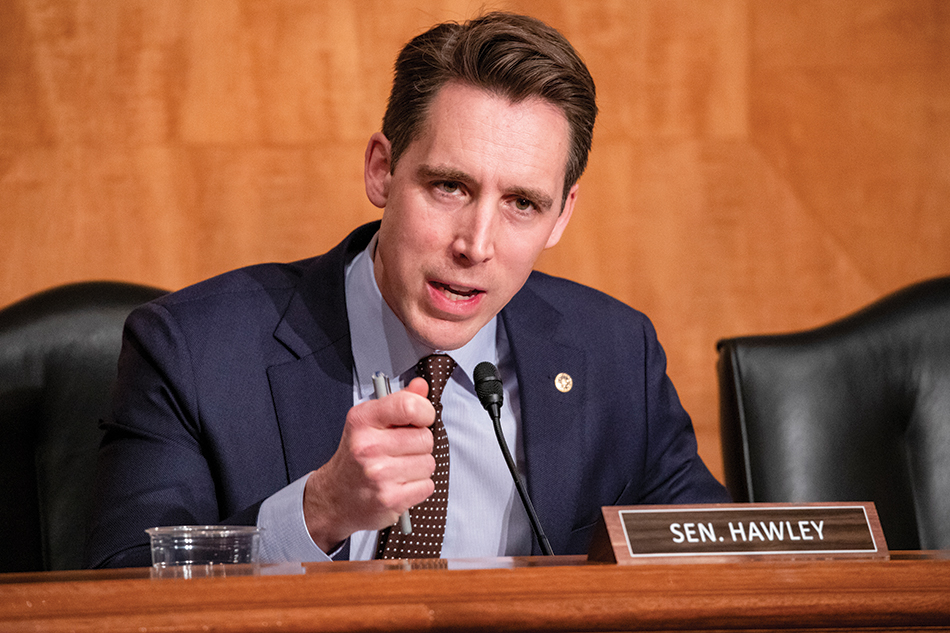FTC Wades Into Big Tech
The smarter way to stay on top of the multichannel video marketplace. Sign up below.
You are now subscribed
Your newsletter sign-up was successful
There has been a lot of talk inside the Beltway about whether tech giants have gotten to near monopoly status by anti-competitively buying up competitors in their infancy before they can trigger red flags with antitrust regulators, then reaping the fruits of never-were competitors’ innovations.

Now the Federal Trade Commission is doing something about getting to the bottom of that concern, though it is facing a challenge from a critic of edge providers trying to recraft the FTC as a digital-focused investigative arm — but one no longer independent from the Trump cabinet.
Sen. Josh Hawley (R-Mo.), arguably the leading critic of tech companies in Congress, says overhauling the FTC and merging it into the Justice Department is the best approach to regulating edge providers.
He also said the government doesn't need to create a new "unaccountable bureaucracy" to oversee Big Tech, as some have suggested Congress should do. FTC chairman Joseph Simons agreed, saying that the FTC, with added resources and authority, is the right agency for the job.
“The FTC isn’t working,” Hawley said in announcing his new campaign. “It wastes time in turf wars with the DOJ, nobody is accountable for decisions, and it lacks the ‘teeth’ to get after Big Tech’s rampant abuses. Congress needs to do something about it.”
The senator would also get the FTC out of the merger review business, leaving that duty to the DOJ (see Below).
Almost everyone, including the head of the FTC, agrees that the agency could use more tools in its tech reg toolkit, including more money and staff. That’s particularly true now that it has the principal oversight of broadband privacy and access.
The smarter way to stay on top of the multichannel video marketplace. Sign up below.
Bringing FTC to Justice
Hawley wants to help by putting the FTC under Justice and making it accountable to that agency, which would be a big change but would provide more market analysis and enforcement muscle.
Currently, the agency must sue companies to enforce its policies, rather than regulate compliance. Hawley says that means it lacks the "teeth" to go after what he calls tech's "rampant abuses."
Hawley's call for an overhaul came the same day the commission said it would start flexing what muscle it has.
It sent "special order" information requests to five of the biggest tech players — Google, Amazon, Apple, Facebook and Microsoft — seeking information and documents to help it review the "terms, scope, structure, and purpose of transactions that each company consummated between Jan. 1, 2010 and Dec. 31, 2019."
The Trump administration has signaled it would take a retrospective look at some of the deals that may have passed under its antitrust radar as Big Tech got bigger, just to make sure they did not build those collective trillion-dollar market caps via anticompetitive means.
Assistant Attorney General Makan Delrahim, the DOJ’s antitrust chief, has said that big, even to the extent of being a natural monopoly, isn't necessarily bad. But he has conceded the market needs a fresh look.
“One of the FTC's biggest problems is that Congress has cut its funding over the decades, leaving the agency under-resourced to do its job,” Joshua Stager, senior counsel at New America's Open Technology Institute, said. “Senator Hawley's proposal does not acknowledge this reality, nor does he acknowledge that his own institution bears at least some blame for starving the agency of resources. It is difficult to take this proposal seriously when it ignores such a core problem.”
Argued Hawley: “The reality is the FTC is not putting even its current resources to effective use because the FTC is poorly designed.”
THE HAWLEY PLAN
The following is excerpted from Sen. Josh Hawley’s outline of a new FTC under the Justice Department:
Accountability
Restructure the FTC to operate within the DOJ
— The FTC would be headed by a single director (like the FBI), instead of a multi-member commission:
• The director would report to the Associate Attorney General.
• The director would be Senate-confirmed for renewable five-year terms.
• The FTC would gain new market analysis authority to direct its enforcement, assist the Antitrust Division and inform Congress.
— Transfer all authority to review mergers and acquisitions to the Antitrust Division of the DOJ:
• Create more tools for robust enforcement.
• Create authority to enforce rules requiring interoperability, data portability and data minimization.
• Create civil penalties for first-time offenses.
• Give the FTC greater research and reporting mandates.
• Give state attorneys general concurrent enforcement authority.
SOURCE: Office of Sen. Josh Hawley
Contributing editor John Eggerton has been an editor and/or writer on media regulation, legislation and policy for over four decades, including covering the FCC, FTC, Congress, the major media trade associations, and the federal courts. In addition to Multichannel News and Broadcasting + Cable, his work has appeared in Radio World, TV Technology, TV Fax, This Week in Consumer Electronics, Variety and the Encyclopedia Britannica.

